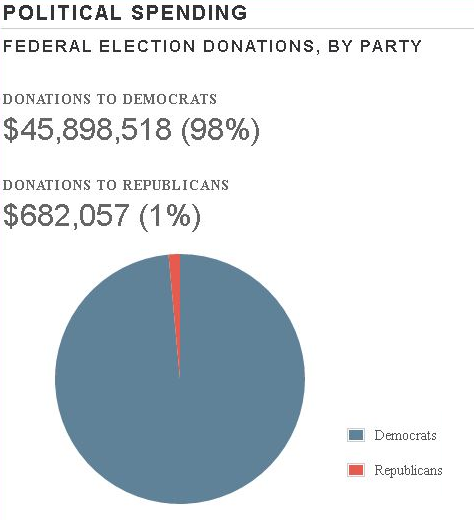
Astonishing article from the Daily Signal.
Excerpt:
Unions across the country donated $765 million to various organizations over the last four years, and 99 percent of that cash went to liberal-leaning causes.
Labor unions gave $764,952,394 to left-wing special interests between 2012 and 2016, according to the Center for Union Facts. Of the nearly $765 million, 99 percent of union political contributions went to left-wing causes. The Center for Union Facts compiled a comprehensive database of information about labor unions in the United States: outlining union spending, salary information, dues revenue data, and more using data from the U.S. Department of Labor.
Examples of who gets the money:
The department’s data show between 2012 and 2016, roughly $240 million went to left-wing political groups. Labor unions gave $77 million to special-interest groups and another $13 million to environmental groups. Over $25 million went to groups like the Coalition of Black Trade Unionists, the National Association for the Advancement of Colored People, and the Rainbow PUSH Coalition.
During this same time frame, almost $307 million went to the Democratic Party and aligned groups, including Media Matters, the Clinton Foundation, Mi Familia Vota, the National Democratic Club, the Advocacy Fund, Progressive Democrats of America, and Planned Parenthood.
[…]Here’s how much a few pro-abortion groups received from labor unions since 2007, according to Luka Ladan, communications director for the Center for Union Facts:
- Planned Parenthood: $1.18 million
- Emily’s List: $810,000
- NARAL Pro-Choice America: $45,000
Examples of who gives the money:
Here are the dollar amounts since 2007 that a few labor unions have given for abortion lobby funding:
- American Federation of Teachers: $1,150,000
- American Federation of State, County, and Municipal Employees: $520,100
- International Association of Firefighters: $10,000
- Service Employees International Union: $180,000
- United Association: $40,000
- United Auto Workers: $100,000
- United Food and Commercial Workers International Union: $35,000
Teachers, non-import auto workers, government employees. All pro-abortion. I never buy cars made by union employees, I’d just be funding abortionists.
I think there was a time in America’s history where unions were actually doing some good, but that time has long gone. We can’t allow labor unions to take the country in the direction of Greece and Venezuela, otherwise none of us will have jobs, and we’ll be selling our bodies for food, like they do in other communist countries. I would like to see some legislation banning public sector unions outright, and then a national right to work law should finish off the private sector unions, since rank-and-file private sector union workers are typical not radical leftists. We definitely need a national voucher law to get the money out of the public schools and back into the hands of parents.
Whenever well-meaning people vote for more taxpayer more for union-dominated fields like education, keep in mind that a significant portion of this money gets funneled back into anti-American causes. Be careful about wanting to spending more taxpayer money “for the children”, because it often turns out to just be more taxpayer money for the Planned Parenthood, or for the Clinton Foundation, etc.

